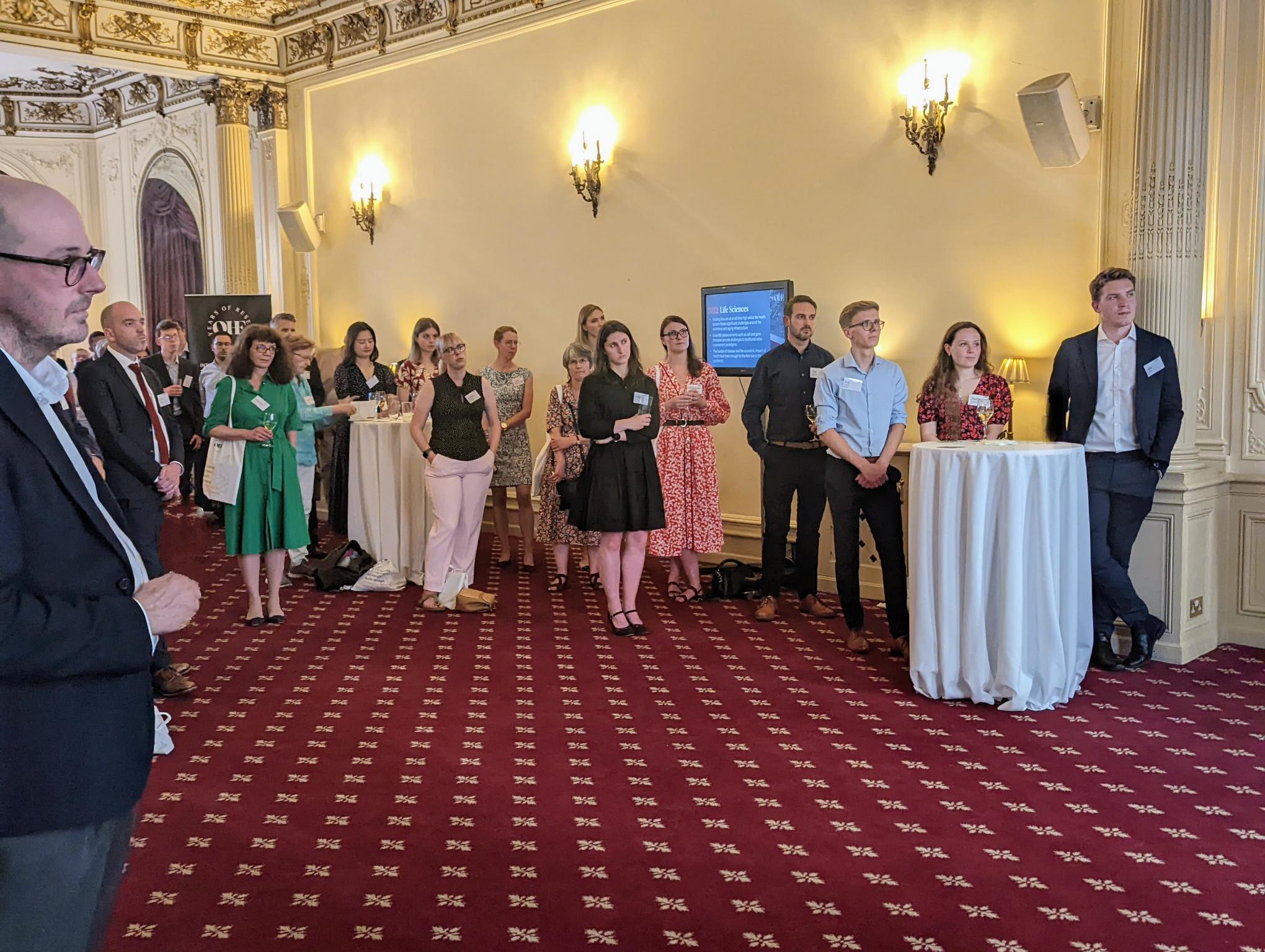Unlocking the Value of Combination Therapies



At the recent ISPOR Annual Conference, OHE’s Chief Executive, Professor Graham Cookson announced a new programme of work on Value 2.0: Assessing the Value of US Healthcare to be funded by PhRMA. Graham was joined by the Innovation and Value…
At the recent ISPOR Annual Conference, OHE’s Chief Executive, Professor Graham Cookson announced a new programme of work on Value 2.0: Assessing the Value of US Healthcare to be funded by PhRMA. Graham was joined by the Innovation and Value Institute’s Executive Director Jenn Bright, and Harvard Medical School Professor Bapu Jena.
OHE and The Value Collaborative, an initiative of America’s biopharmaceutical companies, co-hosted a cocktail reception at the recent ISPOR conference in New Orleans entitled Moving the Needle on Value.
OHE’s Chief Executive, Professor Graham Cookson, used the event to announce a new programme of work assessing the value of US healthcare. Graham was joined by the Innovation and Value Initiative’s Executive Director Jenn Bright, and Harvard Medical School Professor Bapu Jena.
The US spends 18% of GDP on healthcare, totalling $3.5 trillion. Healthcare costs in the US increased by 4% per annum in 2017 and are predicted to continue escalating. There is wide agreement that the growth in healthcare costs is unsustainable.
Graham asked “how can we move the needle on value?” Value-based healthcare, in which healthcare is organised, delivered, and reimbursed to maximise value for patients, has long been talked about. To date, value assessment, the practice of measuring the relative costs and benefits of interventions, has been applied almost exclusively to medicines and medical technology.
Similarly, there has been significant political and media attention given to the cost of medicines. But, this attention in terms of policy and evidence generation to medicines is disproportionate to the impact on spending. Medicines represent about 14% of US healthcare expenditure, roughly the same as they did in 1960, whilst spending on hospital care represents the largest share of current healthcare spending at $1.1 trillion. Additionally, there are numerous studies that provide examples of spending on care that provides no or low value (e.g. inappropriate diagnostic testing), estimated to cost hundreds of billions of dollars each year.
Value-based healthcare is a sound principle but for it to work it requires: (i) that the full value of healthcare is recognised and adequately measured, and (ii) a fair mechanism for evaluating all spending across the spectrum of healthcare equally. A new coherent framework for a widescale approach to achieving value is needed to truly move the needle.
A key challenge to this approach is the lack of alignment on what is meant by value and for whom. That’s the big takeaway from the University of Utah’s recent The State of Value in U.S. Health Care survey. They asked more than 5,000 patients, more than 600 physicians, and more than 500 employers who provide medical benefits across the US how they think about the quality, service, and cost of healthcare. The study made it clear that there is no consensus on what is meant by value and quality of care. The Innovation and Value Initiative’s Jenn Bright raised the issue that patients feel excluded from the decision-making process, and they feel that the current system fails to recognise what is of value to patients and their families and carers.
Harvard’s Bapu Jena argued that research has shown that there is often no correlation between healthcare expenditure and the quality of care. Moreover, many of the advances in outcomes such as life expectancy have been driven by technological and pharmaceutical innovation, and less so by changes in medical practice. Bapu then offered some personal reflections on why there is much greater attention given to the value, and value for money, of pharmaceutical expenditure than on other aspects of healthcare.
The event was well attended by a mix of academics, policy specialists, and industry professionals, who were invited to share their thoughts on the topic. OHE’s Adrian Towse summarised the short talks and closed the event by inviting attendees to collaborate with OHE on our forthcoming research. The invitation is open to anybody who is interested in understanding more about elements of value and in value-based healthcare.
There were three takeaway messages from the event. First, that in the absence of perfect markets, value assessment is necessary to ensure that healthcare expenditure is spent optimally. Second, that in order to do that, we need to ensure that we have a common understanding of value, capturing what matters most to patients and society. And third, that this will only deliver major gains if it’s applied across all aspects of healthcare expenditure.
The drinks and canapes at the event were sponsored by The Value Collaborative – an initiative of America’s biopharmaceutical companies.
An error has occurred, please try again later.
This website uses cookies so that we can provide you with the best user experience possible. Cookie information is stored in your browser and performs functions such as recognising you when you return to our website and helping our team to understand which sections of the website you find most interesting and useful.
Strictly Necessary Cookie should be enabled at all times so that we can save your preferences for cookie settings.
If you disable this cookie, we will not be able to save your preferences. This means that every time you visit this website you will need to enable or disable cookies again.
This website uses Google Analytics to collect anonymous information such as the number of visitors to the site, and the most popular pages.
Keeping this cookie enabled helps us to improve our website.
Please enable Strictly Necessary Cookies first so that we can save your preferences!

